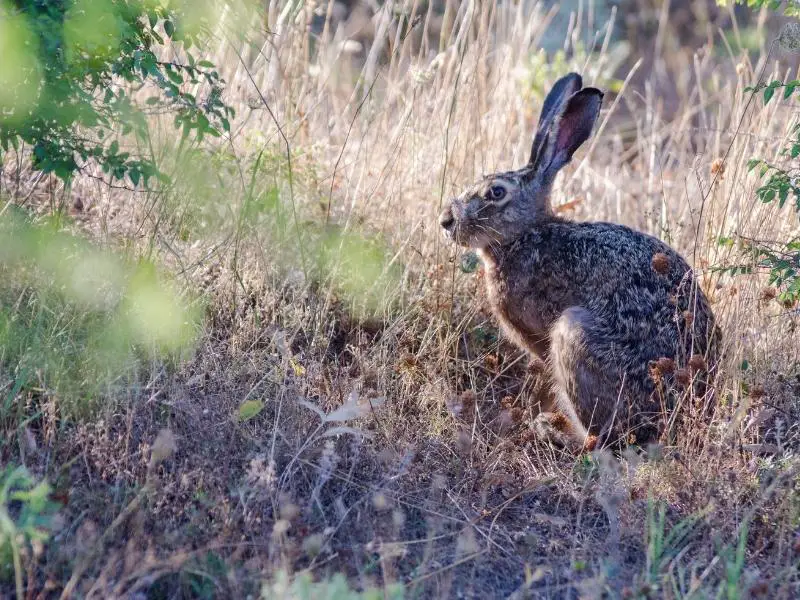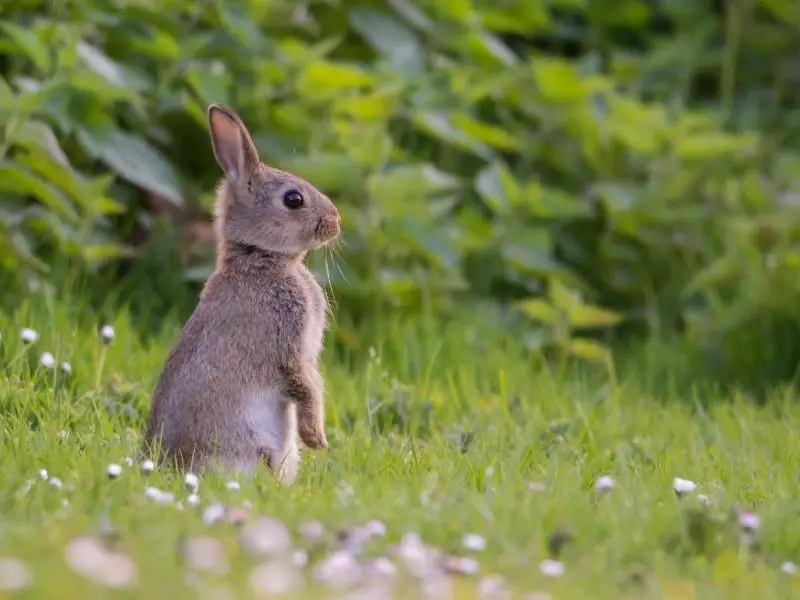Domestic or pet rabbits are the result of domesticating wild rabbits. But can and should the wild rabbits you see in your backyard, in nearby fields, and forests be domesticated?
The wild rabbits, whether injured or healthy, that you come across shouldn’t be domesticated. These rabbits aren’t at all like the pet bunnies you can adopt, love, and care for. Plus, depending on where you live, it may be illegal to keep a wild animal, and wild animals spread dangerous diseases.
Read on if you are ready to learn more about this fascinating topic of why you shouldn’t domesticate a wild rabbit.
Can You Raise a Wild Rabbit?
Technically, you can raise a wild rabbit, but that doesn’t mean you should.
There are various reasons why raising a wild rabbit and domesticating it isn’t a good idea, but more on this later. In essence, however, raising a wild animal isn’t a call you should ever make.
It’s considered unethical because wild animals aren’t meant to be pets – it’s not the life they are meant to live. Believing that if you don’t look after the animal it won’t survive isn’t true.
You can rather call a licensed wildlife rehabilitator to take over caring for an injured wild bunny. These professionals know what they are doing and they’ll act in the best interest of the rabbit.
All in all, a wild rabbit isn’t the same as the cute pet bunnies you can adopt and raise. Wild and domesticated rabbits don’t:
- Look the same (not really)
- Have the same diets
- Have the same needs
- Have the same temperaments
You may have read some success stories of ordinary people domesticating wild rabbits – the truth is that these animals merely become used to you. That doesn’t make them a pet.
And in fact, provided a wild rabbit is healthy, it can be rewilded. A true domesticated pet can’t be rewilded – they simply won’t survive in the wild because that’s not what they are bred to do.
What Happens If You Pet a Wild Rabbit?
It’s likely that a wild rabbit will flee if you try to get close and pet it. If the rabbit is injured, it’ll most likely bite, scratch, or kick you should you be able to get close enough to pet it.
On the off chance you aren’t injured when petting a wild rabbit, it’s likely that the rabbit can have tularemia (rabbit fever) or other transmittable zoonotic diseases.
Even if you don’t become sick, you can pass the zoonotic disease on to a pet rabbit, dog, cat, or other domesticated animals when you handle them (if you haven’t thoroughly washed and disinfected your hands).
How to Pet a Wild Rabbit
You shouldn’t try to pet a wild baby rabbit or wild adult rabbit. But if you aren’t sure whether it is a wild rabbit or a lost domesticated one, stay where you are and see if the rabbit will come to you.
A pet bunny will be curious and come explore, while a wild rabbit most likely won’t. They’ll hop off and will be too scared to approach.
If it is indeed a lost pet bunny, you need to stay calm and put the rabbit in a dog or cat carrier. If you do need to pick it up, wear gloves because you don’t know what diseases the rabbit may have, but be gentle.
Offer the rabbit water and some leafy green veggies or small pieces of fruit.
If you have a community group, send out a message to try to find the owner, or take the rabbit to your local vet who’ll be able to tell if the bunny is microchipped.
Risks of Raising a Wild Rabbit

There are various risks of raising and domesticating a wild rabbit:
It May Be Illegal
Even if you have the skills to take care of a wild rabbit, it may not be legal to keep wild animals in your state.
Findlaw.com lists the states in which you need a permit to own exotic animals and in which it’s prohibited or restricted. It is always safer to check with your county and state as there may have been changes to regulation.
At the time of writing, according to findlaw.com, it’s illegal to own wild animals like cottontail and snowshoe rabbits as pets in:
- Utah
- Oklahoma (including swamp and other native wild rabbits)
- Nevada
- Minnesota
- Georgia
In Nebraska, Missouri, and Indiana, for example, you need a permit to own cottontail rabbits.
Wild Rabbits Carry Diseases
Wild rabbits carry various zoonotic diseases that can be transmittable to you and other domestic animals like your pet bunnies, dogs, and cats. In most cases, these diseases are fatal if you or the sick animal doesn’t get the right treatment right away.
Some of the diseases that are transmittable include:
- Tularemia (rabbit fever)
- Myxomatosis
- Viral hemorrhagic disease
- Hantavirus
- Ringworm
- Pasteurellosis
- Leptospirosis
- Cryptosporidiosis
- Mycobacteriosis
- Various other parasites
Wild Rabbits Don’t Behave Like Pet Rabbits
Wild rabbits are born to live in the wild. They only know flight or fight behavior when they see a predator – and that includes you.
If you are “successful” in taming a wild rabbit, they won’t ever behave like a pet bunny. Sure, their wariness of you may wane after a very long time, but that’s only because they have become used to you. A pet bunny does learn to trust and love you.
A wild rabbit will also try to escape every chance it gets. This means digging holes and even hurting you to try and get away.
A Wild Rabbit Eats Differently
A wild rabbit doesn’t have the same diet as a domestic rabbit. In the wild, their diet is more varied and they are used to foraging for food.
A Wild Rabbit Will Feel Stressed
If caged, a wild rabbit will become stressed. And rabbits – both wild and domestic – are sensitive animals, so any stress can easily be fatal.
Loud noises, music, and even you approaching is enough to give a wild rabbit a heart attack, which is instant death.
My Last Bunny Thoughts
It isn’t an easy choice to leave a wild rabbit in their natural wild habitat where they can get injured, killed, and/or eaten by any number of predators.
Taming a wild animal, rabbit or any other, involves a range of skills normal folks don’t have.
And finally, there are the moral and ethical questions of should a wild rabbit be domesticated.
Is it morally and ethically right to take a wild rabbit out of the environment they know and where they are intended to live just because you may think you can better care for it and it’ll live longer under your care?

